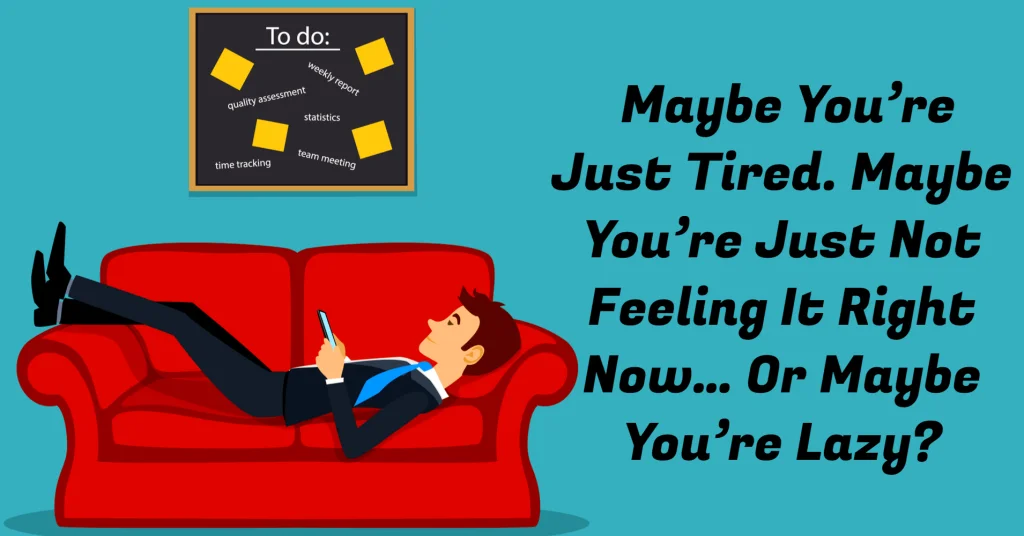Do you ever feel like you just don’t have enough energy to do anything? Or do you sometimes find yourself sitting in front of the TV or computer for hours on end, not doing anything? Do you often find yourself asking am I lazy? If so, you might be experiencing symptoms of laziness. Laziness is a condition that can affect people of all ages and backgrounds.
It can cause a lot of problems in someone’s life, both personally and professionally. In this article, we will discuss what laziness is, the different types of laziness, the causes of laziness, the signs and symptoms of laziness, and how to deal with it.
Contents
Understanding Laziness
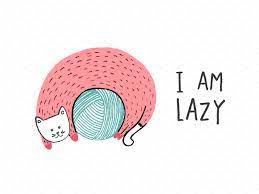
Laziness is a condition that involves having a lack of motivation and energy to do things. It can cause someone to have problems getting started on tasks, completing tasks, or staying focused on tasks. Laziness can also lead to feelings of boredom and apathy.
Laziness is a very common condition. It can affect people of all ages and backgrounds. According to one study, approximately 25% of people experience symptoms of laziness at some point in their lives.
What Are Types Of Laziness?
There are different types of laziness, each with its own set of symptoms. The three main types of laziness are physical laziness, mental laziness, and emotional laziness.
Physical Laziness
Physical laziness is a condition that involves having a lack of energy and motivation to do physical activities. Physically lazy people often find it hard to get up and move around. They may also have trouble completing physical tasks or activities.
Mental Laziness
Mental laziness is a condition that involves having a lack of energy and motivation to do mental activities. Mentally lazy people often find it hard to get started on tasks, stay focused on tasks, or complete tasks. They may also feel bored easily.
Emotional Laziness
Emotional laziness is a condition that involves having a lack of energy and motivation to do emotional activities. Emotionally lazy people often find it hard to express their feelings, connect with others, or participate in activities that involve emotions.
What Are Degrees Of Laziness?
Laziness can also be classified as being mild, moderate, or severe.
- Mild laziness is the most common type and involves having a lack of energy and motivation to do tasks, but being able to complete them with some effort.
- Moderate laziness involves having a lot of difficulties getting started on tasks, completing tasks, or staying focused on tasks.
- Severe laziness is the rarest type and involves not being able to do many tasks, even with a lot of effort.
What Are Causes Of Laziness?

There are many different causes of laziness. Some of the most common causes include:
Lack of energy: One of the main reasons people experience symptoms of laziness is because they don’t have enough energy to do anything. This can be caused by a lack of sleep, dehydration, or malnutrition.
Poor self-esteem: People who have low self-esteem may be more likely to experience symptoms of laziness. They may feel like they are not good enough or worthy enough to do anything.
Stress: When someone is stressed out, they may find it hard to get started on tasks or stay focused on tasks. This is because stress can cause someone to feel tired and overwhelmed.
Procrastination: Procrastination is the act of delaying tasks until later. People who are procrastinators often find it hard to get started on tasks and stay focused on them.
Lack of motivation: People who do not have a clear goal or purpose in their lives may be more likely to experience symptoms of laziness.
Lack of interest: People who are not interested in the task at hand may be more likely to experience symptoms of laziness.
Depression: Laziness can often be a symptom of depression. People who are depressed may find it hard to get up and do anything, including the tasks they enjoy.
Anxiety: Like depression, anxiety can also lead to symptoms of laziness. Anxious people may find it hard to focus on tasks or complete them.
Poor health: If someone is not feeling well, they may be more likely to experience symptoms of laziness. This can be due to an illness or injury.
Social isolation: People who are isolated from others may be more likely to experience symptoms of laziness.
Boredom: Bored People may be more likely to experience symptoms of laziness.
What Are Signs And Symptoms Of Laziness?
The signs and symptoms of laziness can vary depending on the type of laziness a person has. However, some of the most common signs and symptoms include:
Task Symptoms
Finding it hard to get started on tasks: Lazy People often find it hard to get started on tasks, whether they are mental or physical tasks.
Having a lack of energy and motivation to do tasks: This is the most common sign and symptom of laziness.
Staying focused on tasks: Lazy People may have a lot of difficulty staying focused on tasks, especially if those tasks are not interesting to them.
Traits Symptoms

Feeling overwhelmed: Lazy People may feel overwhelmed by tasks, as they find it difficult to complete them.
Feeling unmotivated: Lazy People often do not have a clear goal or purpose in their lives, which leads to them feeling unmotivated to do anything.
Frequently feeling bored: Lazy People may find themselves feeling bored a lot of the time, as they do not have anything that interests them to do.
Having low self-esteem: Lazy People often have low self-esteem, as they feel like they are not good enough to do anything.
Procrastinating: People who are lazy often procrastinate, or delay doing tasks until later.
Being isolated from others: Lazy People may be isolated from others, as they do not have many friends or activities that interest them.
Feeling depressed: Lazy People may often feel depressed, as they find it hard to get up and do anything.
Having anxiety: Lazy People may also experience anxiety, as they find it hard to focus on tasks or complete them.
Other Symptoms
Excessive sleeping or napping: Lazy People may sleep for a long time or take naps frequently, as they do not have anything else to do.
Not being able to express feelings: Lazy People may have a lot of difficulties expressing their feelings, as they do not want to deal with them.
Poor hygiene: Lazy People may not take care of their hygiene, as they do not see the point in doing so.
NOTE: The signs and symptoms of laziness and the reasons causing the same flow in a loop. It means they are interrelated, that is one causing the other.
Evaluating Laziness
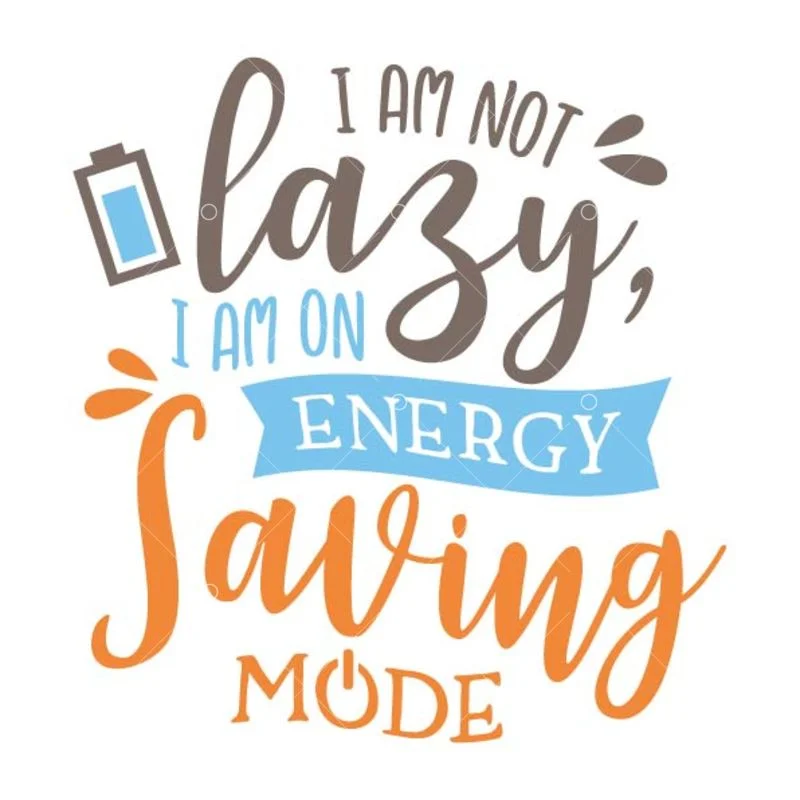
There are a few different ways to evaluate laziness:
What Are The Negative Outcomes Of Laziness?
The negative outcomes of laziness can vary depending on the type of laziness a person has. However, some of the most common negative outcomes include:
Having a low quality of life: Lazy People often have a low quality of life, as they do not do anything interesting or fulfilling.
Being unproductive: Lazy People are often unproductive, as they do not do anything to help themselves or society.
Frequently feeling stressed: Lazy People often feel stressed out, as they have a lot of trouble completing tasks.
Having a lack of motivation: Lazy People often do not have a clear goal or purpose in their lives, which leads to them feeling unmotivated to do anything.
Being isolated from others: Lazy People may be isolated from others, as they do not have many friends or activities that interest them.
Feeling depressed: Lazy People often feel depressed, as they find it hard to get up and do anything.
Having anxiety: Lazy People may also experience anxiety, as they find it hard to focus on tasks or complete them.
Excessive sleeping or napping: Lazy People may sleep for a long time or take naps frequently, as they do not have anything else to do.
Poor hygiene: Lazy People may not take care of their hygiene, as they do not see the point in doing so.
Not being able to express feelings: Lazy People may have a lot of difficulties expressing their feelings, as they do not want to deal with them.
What Are The Positive Outcomes Of Laziness?
There are a few positive outcomes of laziness, which include:
Having more time for leisure activities: Lazy People may have more time for leisure activities, as they do not have to do any tasks. This can include watching TV, reading, going for walks, etc.
Being relaxed: Lazy People may be relaxed most of the time, as they do not have to worry about anything.
Having a low-stress level: Lazy People often have a low-stress level, as they do not have any pressure to do anything.
Doing things at their own pace: Lazy People often do things at their own pace, as they do not feel the need to hurry.
Being creative: Lazy People may be more creative, as they have more time to think about things.
Is It Okay Sometimes Being Lazy?
It is okay to be lazy sometimes, as it can help people relax and take a break from their busy lives. However, it is important to make sure that laziness does not become a habit and prevents people from doing anything productive.
Comparing Laziness

How Laziness Differs From Depression?
Depression and laziness can sometimes look very similar, as people may not feel like doing anything. However, there are a few key differences between the two. People with depression:
- Often have negative thoughts about themselves, while lazy people generally do not.
- Often experience feelings of sadness or hopelessness, while lazy people may feel more apathetic.
- May have a lack of energy, while lazy people often have plenty of energy.
- May feel like they cannot enjoy anything, while lazy people may still enjoy some activities.
How Laziness Differs From Procrastination?
Procrastination and laziness can also look very similar, as people may not feel like doing anything. However, there are a few key differences between the two. People who procrastinate:
- Usually do not want to do the task they are delaying, while lazy people may want to do the task but they just don’t feel motivated.
- Are often anxious about completing the task, while lazy people generally do not feel anxious about it.
- Are usually very focused on the task they are delaying, while lazy people may not be very focused on anything.
Coping With Laziness
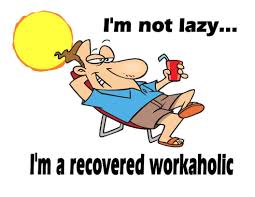
There are a few self-help tips that people can use to help accomplish a task, which includes:
Setting goals: When a person sets goals, they are more likely to be motivated to accomplish them.
Breaking down tasks: When a task seems too daunting, it is helpful to break it down into smaller parts.
Rewarding oneself for completing tasks: When a person completes a task, they should reward themselves with something beneficial to them.
Keeping a positive attitude: It is important for people who are trying to overcome laziness to keep a positive attitude and stay motivated.
What Are Treatment Options For Laziness?
There are a few treatment options for laziness, which include:
Therapy: Therapy can help people who are lazy to understand the reasons behind their behavior and find strategies to overcome it.
Medication: If therapy is not successful, one can try medications to help treat laziness.
Self-help groups: There are self-help groups available for people who are struggling with laziness.
What Therapies Help Treat Laziness?
There are a few therapies that help treat laziness, which include:
Cognitive-behavioral therapy (CBT): CBT can help people change their negative thoughts and behaviors into positive ones.
Behavioral therapy: Behavioral therapy can help people learn new skills to replace the old, destructive ones.
Interpersonal therapy (IPT): IPT helps people understand and deal with their relationships.
Motivational interviewing: Motivational interviewing helps people find their motivation to change their behavior.
What Medications Do Professionals Prescribe For Treating Laziness?
There are a few medications that help treat laziness, which include:
Selective serotonin reuptake inhibitors (SSRIs): SSRIs are antidepressants that help increase the amount of serotonin in the brain.
Serotonin-norepinephrine reuptake inhibitors (SNRIs): SNRIs are antidepressants that help increase the amount of serotonin and norepinephrine in the brain.
Monoamine oxidase inhibitors (MAOIs): MAOIs are antidepressants that help block the action of monoamine oxidase, which breaks down neurotransmitters like serotonin and norepinephrine.
NOTE: If the person has been trying different therapies but has not seen any improvement, then medications may be one option to consider. However, it is important to note that medications should be a last resort and you should discuss them with your doctor first.
How Diet Can Help Treat Laziness?
There are a few things that people can do to their diet to help treat laziness, which include:
Eating breakfast: Breakfast is the most important meal of the day and it is important for people who are lazy to eat something nutritious.
Eating healthy foods: Eating healthy foods like fruits and vegetables can help boost a person’s energy levels.
Avoiding caffeine and sugar: Caffeine and sugar can harm a person’s energy levels.
Exercising regularly: Exercising is a great way to boost energy levels and it is important for people who are lazy to exercise regularly.
How Exercise Can Help Treat Laziness?
There are a few ways in which exercise can help treat laziness, which include:
Boosting energy levels: Exercise can help boost a person’s energy levels, which can help them accomplish their goals.
Helping to focus: Exercise can help people focus on the task at hand and it can also help improve their concentration.
Reducing stress: Exercise can help reduce stress, which can then lead to a person being less lazy.
Talking To A Professional
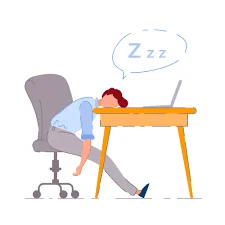
If people are feeling overwhelmed by their laziness, they may want to talk to a professional about it. There are a few things that professionals can help with, which include:
Understanding the causes of laziness: A professional can help a person understand the causes of their laziness and why they feel the need to be lazy.
Developing a treatment plan: A professional can help develop a treatment plan that is according to the individual’s needs.
Providing support: A professional can provide support and encouragement to the person as they work to overcome their laziness.
Experts’ View About Laziness
There is no one answer to the question of what causes laziness, as there can be many different factors behind it. However, some experts believe that laziness may be a consequence of:
Depression: Laziness may be a symptom of depression.
Procrastination: Laziness and procrastination can often go hand in hand.
Anxiety: Anxiety can lead to people feeling overwhelmed and stressed, which can then lead to them being lazy.
Attention-deficit/hyperactivity disorder (ADHD): People with ADHD may be more likely to be lazy as they have trouble focusing on tasks.
Case Study
In the following case study, a woman named Sarah discusses her experience with laziness:
“I’ve always been a very lazy person. I never liked doing anything and would always find excuses to not do anything. So, I was always very unmotivated and would just lay in bed all day. And, I didn’t have any energy to do anything. Thus, I eventually stopped working and started living off of my savings. By now, I was miserable and felt like I had no purpose in life.
A friend of mine told me about a program that could help me, so I decided to give it a try. The program was very intensive and required me to attend Therapy Mantra sessions and group meetings. I also had to start exercising and eating healthy.
It was hard at first, but eventually, I started seeing results. I started feeling more motivated and began doing some things on my own. I’m still not the most active person, but I’m a lot better than I used to be. I’m very grateful for the program and the people who helped me.”
Movies And Books
There are a few movies and books that deal with the topic of laziness, which include:
The Revenant: In this movie, Hugh Glass is left for dead by his companions after being mauled by a bear. He then spends the next several months struggling to make it back to them.
The Shawshank Redemption: In this movie, Andy Dufresne is sentenced to life in prison for the murder of his wife and her lover. He then spends the next 20 years trying to find a way to escape.
The Catcher in the Rye: Holden Caulfield is a teenager who is kicked out of boarding school and goes on a journey around America.
Laziness: This novel tells the story of a young man who is struggling with laziness and how it affects his life.
Conclusion
In conclusion, laziness can be a consequence of many different things and can have negative and positive outcomes. However, there are treatment options available that can help people overcome their laziness. Talking to a professional can help determine the causes of laziness and develop a treatment plan. Some movies and books deal with the topic of laziness, which can provide insight into this issue.
A Word From Therapy Mantra
Your mental health — Your psychological, emotional, and social well-being — has an impact on every aspect of your life. Positive mental health essentially allows you to effectively deal with life’s everyday challenges.
At TherapyMantra, we have a team of therapists who provide affordable online therapy to assist you with issues such as depression, anxiety, stress, workplace Issues, addiction, relationship, OCD, LGBTQ, and PTSD. You can book a free therapy or download our free Android or iOS app.
